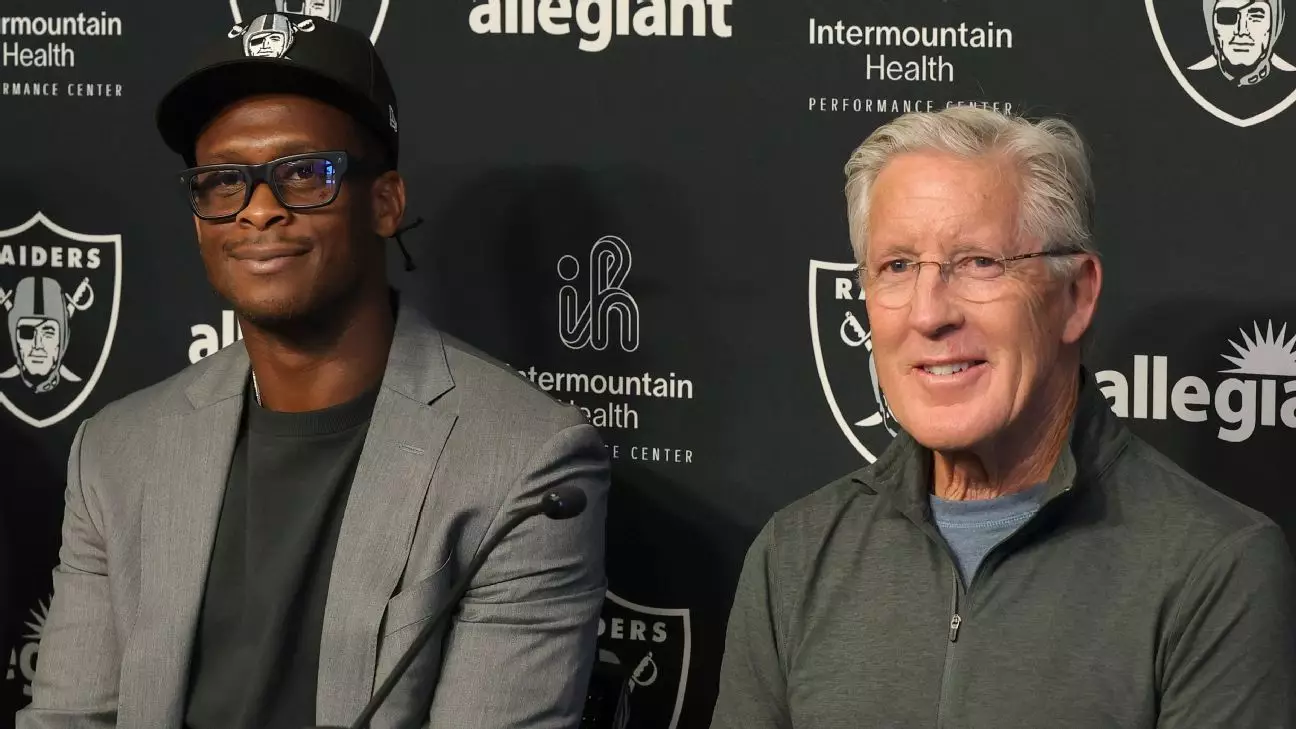Geno Smith’s trade from the Seattle Seahawks to the Las Vegas Raiders marks not just a strategic maneuver in the NFL but a personal testament to the strength of relationships in professional sports. As Smith stepped onto the podium to address the media in Henderson, he exuded both optimism and gratitude, particularly acknowledging his former head coach, Pete Carroll. This connection is emblematic of how vital coaching philosophies and player-coach relationships can be in shaping an athlete’s career trajectory. Smith didn’t just leave a team; he carried with him years of mentorship and trust established with Carroll, which is a rare commodity in the hyper-competitive world of professional football.
Smith’s mention of “unfinished business” resonated deeply. It suggests that his journey isn’t merely about winning games but also about proving his worth. In an era where quarterbacks are often judged by immediate performance, Smith’s narrative challenges the conventional notion surrounding success and achievement. His ability to mature under Carroll’s watch, transitioning from a backup to a two-time Pro Bowl starter, showcases a commitment that transcends mere athletic skill. Instead, it underscores a philosophy rooted in perseverance and personal growth—qualities often sidelined in the modern sports industry.
Embracing Opportunities and Challenges
Reflecting on the past can be a double-edged sword; it can foster nostalgia or lead to bitterness. Fortunately for Smith, he has chosen the former path. His statement about having “no hard feelings” regarding the Seahawks illuminates a crucial aspect of his character—grit. Many players, after a tumultuous exit from a team, may succumb to resentment. Smith’s perspective, however, is not merely refreshing; it’s instructive. It shows how embracing change—no matter how difficult—can fortify one’s resolve to succeed.
The numbers speak volumes: 8,641 passing yards, 55 touchdowns, and crucially, the trust of a coach who believed in him beyond statistical outputs. While his final season in Seattle raised eyebrows due to a spike in interceptions, it also marked him as a player who consistently elevated his game. The contrast between how he perceived his worth versus how he was valued by others is an essential critique of a sports culture that often defines success in narrow terms.
Las Vegas: A New Playground for Growth
Transitioning to the Raiders, Smith finds himself in a unique position, heralded as a figure of “instant stability” in a franchise still recovering from the fallout of inconsistency in quarterback play. With a promising career ahead, bolstered by a substantial extension reportedly worth up to $85.5 million, Smith’s signing is strategic on multiple levels—not just as a performance upgrade but as a figure to inspire team cohesion.
For the Raiders, acquiring Smith is a gamble, but it’s one rooted in potential high returns. The three seasons marred by instability have left a palpable void for leadership. In this regard, Smith doesn’t just arrive as a player; he embodies the spirit of resilience that the Raiders are eager to foster among their ranks. His experiences, both tumultuous and triumphant, equip him with a unique narrative that peers into the psychological burdens of competing in the NFL.
The Mentor’s Wisdom
Perhaps one of the most compelling aspects of Smith’s journey is his commitment to learning. His interaction with Tom Brady, who would be the envy of any quarterback in the league, underscores a healthy mindset towards mentorship. In an age where athletes often tread the line between humility and bravado, Smith’s eagerness to absorb Brady’s wisdom reflects a remarkable maturity. It’s a throwback to the days when legends weren’t just figures on a pedestal but mentors guiding the next generation.
Smith’s statement, expressing the desire to “learn as much as I can from him,” situates him distinctively amongst his peers. In an industry where egos run rampant, this approach of seeking wisdom signals a broader trend of shifting values in sports. Rather than crumbling under the weight of expectation, Smith’s refreshing perspective may foster a culture that prioritizes camaraderie over competition.
The Bigger Picture
Geno Smith’s journey, from being the underdog to seizing a significant opportunity, captures a narrative that resonates beyond the football field. It encompasses themes of personal growth, resilience, and the transformative power of relationships. As he dons the silver and black, Smith does so not just as a player aspiring for personal accolades but as a symbol of the revolution that football—and by extension all sport—undergo when individuals choose growth over stagnation. The Oakland Raiders have gained more than just a quarterback; they’ve secured a mindset that will uplift their culture, paving the way for what could be a radically transformative decade ahead.

